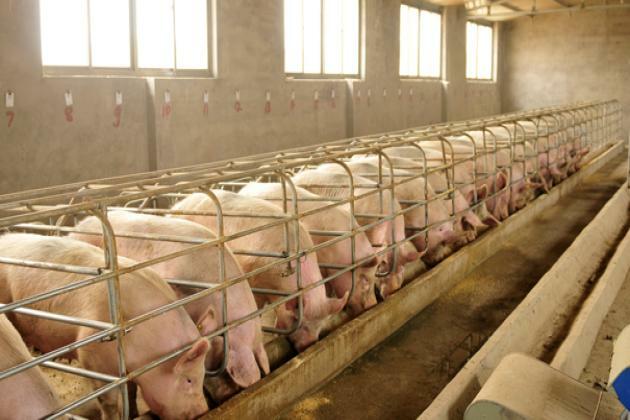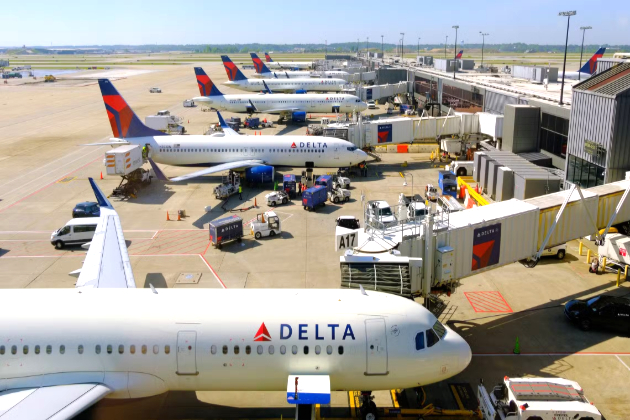US Farmers Hope for US-China Trade Deal as Pork, Soybean Tariffs Ease
Voice of America
17 Sep 2019, 07:12 GMT+10

- Thomas Titus handles all the challenges of running his sprawling Elkhart, Illinois, farm, but lately, he isn't making a lot of money doing it.
- "We're producing corn and we're producing soybeans at below cost of production almost, and we're raising pigs at below cost of production," he told VOA, his voice competing with the sou ...
- It's not unusual for farmers to diversify their products but Titus says his pork operation isn't typical.
ELKHART, IND. - Thomas Titus handles all the challenges of running his sprawling Elkhart, Illinois, farm, but lately, he isn't making a lot of money doing it.
"We're producing corn and we're producing soybeans at below cost of production almost, and we're raising pigs at below cost of production," he told VOA, his voice competing with the sounds of hundreds of hogs housed in one of several nearby buildings. "We're in a challenging time whenever we get to the end of the year and we need to shore up some of those books."
It's not unusual for farmers to diversify their products but Titus says his pork operation isn't typical.
"We're somewhat of a rarity given our size. We're a 600-sow farrow-to-finish farm, so we raise pigs from birth up to market weight, so our size and what we do is a little more dynamic and diverse," he said.
Dependent on trade
In total, Titus raises about 12,000 pigs a year, many sent to the international market. He said much of his profit comes from such exports.
"One in every four pigs we raise goes to a foreign country of some kind, so we are extremely dependent on those positive trade negotiations and trade agreements for the success of our business."
One key buyer of U.S. pork is China, the world's largest importer, which is dealing with a major outbreak of Asian swine fever. As a result, China's pig population has decreased about 20%. Some estimates indicate China has culled more than 1 million pigs.
When it was needed most, American pork was more expensive than other sources because of steep tariffs imposed by the Chinese government, one of many Beijing imposed on American agricultural products amid a protracted trade war with Washington.
Now, China has announced a tariff exemption on U.S.-produced pork, relaxing a punishing 72% duty.
Trade war damage done
But economic damage has been done to the U.S. pork industry.
"We've lost about $1 billion worth of pork sales, or what Iowa State University has put out a study, $8 per hog is what it's cost us on the tariffs," said Karl Setzer, a commodity risk analyst with AgriVisor, who added that even before tariffs, China tended to spread out its purchases.
"China doesn't like to marry themselves to one commodity supplier, be it pork, beef, soybeans, whatever it is," he said.
So when American pork couldn't compete on price because of tariffs, Setzer said China turned more to other suppliers, like the European Union and Brazil.
"Brazil has seen their trade jump 5% in the last year. The trade war isn't helping us at all. We would likely have a bigger share because we are a bigger pork producer, but it comes down to value and what we are willing to sell our pork for," Setzer said. "They're (China) still showing interest in our offerings, but when you look at all the other factors, the trade war on a whole is probably one of the worst ones we've been in."
It's unclear how much China will increase purchases now that certain tariffs, including those on pork and soybeans, are removed.
Supporting Trump, not tweets
And even though, as with other farmers, Titus has taken direct hits for the price of almost everything he is producing on his farm as the trade war continues, he said he still supports President Donald Trump, but would like to see fewer trade negotiations happen via presidential tweet.
"It takes three tweets and this market takes a crash," he said.
Which is why Titus hopes upcoming face-to-face negotiations between the United States and China produce tangible, long-term results, creating some stability for commodity markets, and ultimately his bottom line.
Source: VOA
 Share
Share
 Tweet
Tweet
 Share
Share
 Flip
Flip
 Email
Email
Watch latest videos
Subscribe and Follow
Get a daily dose of Haiti Sun news through our daily email, its complimentary and keeps you fully up to date with world and business news as well.
News RELEASES
Publish news of your business, community or sports group, personnel appointments, major event and more by submitting a news release to Haiti Sun.
More InformationInternational
SectionJudge allows Delta to proceed with CrowdStrike lawsuit
ATLANTA, Georgia: A judge in Georgia has ruled that Delta Air Lines can continue most of its lawsuit against the cybersecurity company...
Bipartisan Senate bill targets China, Russia in nuclear energy race
WASHINGTON, D.C.: U.S. senators from both parties introduced a bill this week aimed at countering China and Russia's growing influence...
Engine failure probed after Mexican Navy ship hits Brooklyn Bridge
NEW YORK CITY, New York: Officials are investigating why a Mexican Navy training ship hit the Brooklyn Bridge on May 17, breaking the...
Department of Justice seeks merger of DEA, ATF; needs Congress nod
WASHINGTON, D.C.: The U.S. Department of Justice wants to merge two of its agencies — the Drug Enforcement Administration and the Bureau...
Spain orders Airbnb to delist 65,000 rentals for illegal listings
MADRID, Spain: Spain has ordered Airbnb to remove more than 65,000 holiday rental listings from its platform, accusing the company...
Victims’ families reject tentative Boeing non-prosecution agreement
WASHINGTON, D.C.: Families of some of the 346 people who died in two deadly Boeing 737 MAX crashes plan to oppose a proposed deal between...
Business
SectionLevi’s to sell Dockers brand for $311 Million, focus on care labels
SAN FRANCISCO, California: Levi Strauss is parting ways with Dockers. The denim giant announced this week that it will sell the Dockers...
Canada’s inflation eases, but core prices rise
OTTAWA, Canada: Canada's inflation picture became more complicated in April, with headline inflation easing but core measures ticking...
Rollercoaster day for U.S. stocks Thursday
NEW YORK, New York - U.S. stocks had a volatile day on Thursday after the House of Representatives narrowly passed President Donald...
Tariffs may limit product availability, warns Home Depot
ATLANTA, Georgia: Home Depot plans to hold prices steady despite the added strain of tariffs, the company said, but warned that some...
DOJ drops lawsuit against Southwest over chronic flight delays
WASHINGTON, D.C.: The U.S. Department of Justice dropped a lawsuit last week against Southwest Airlines. The lawsuit, filed near the...
Airbus, Malaysian air carriers in talks to supply A220 jets
KUALA LUMPUR, Malaysia: Airbus is in discussions with Malaysian airlines to introduce its A220 aircraft, the company's Asia-Pacific...













